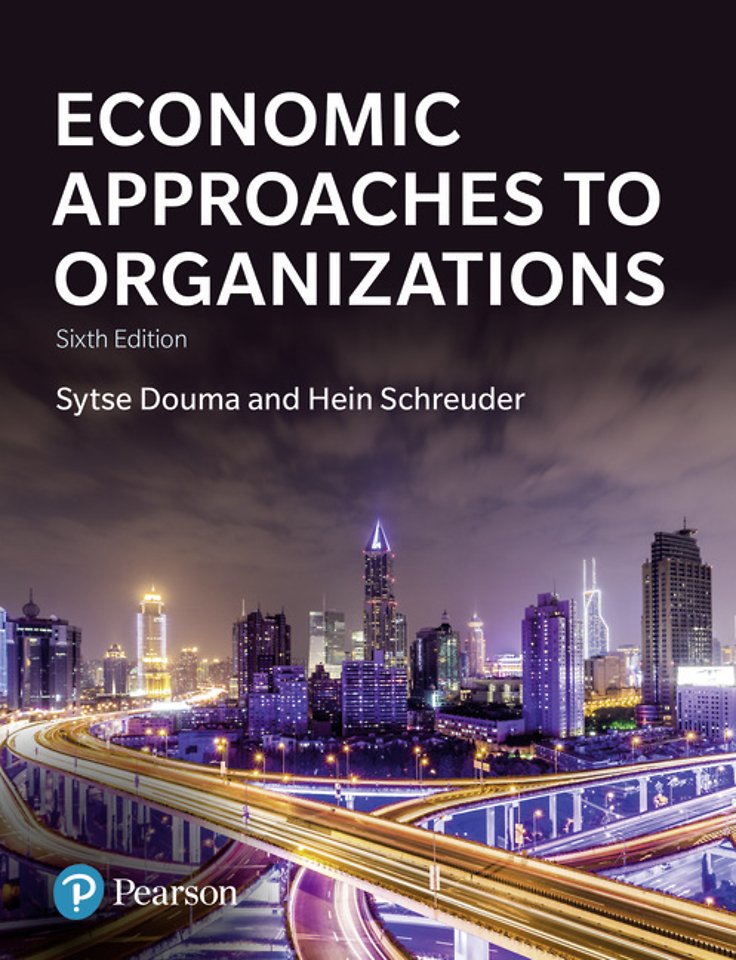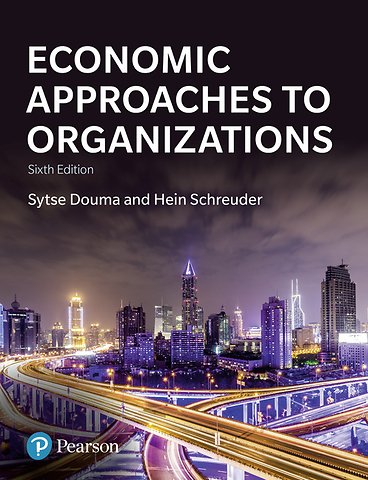


Sytse Douma was hoogleraar aan de Universiteit van Tilburg en hoofd van de afdeling Organisatie en Strategie. Daarnaast was hij voorzitter van de raad van commissarissen van Accell Group NV.
Meer over de auteursEconomic Approaches to Organizations
Paperback Engels 2017 9781292128900Samenvatting
Why do organizations exist?
What is the relationship between markets and organizations?
When does one perform better than the other?
Find the answers in Economic Approaches to Organizations!
Now in its sixth edition, this text emphasizes the importance of economic perspectives and theories in the study of organisations and management.
It explains in a non-technical way different economic approaches such as behavioural theory of the firm, game theory, agency theory, transaction cost economics, economics of strategy and evolutionary approaches.
This fully updated edition is packed with practical examples from real-world companies, helping you to understand how the concepts relate to economic and organisational problems happening in the world today.
New to this edition:
· Introduction of digital platforms as coordination mechanism and platform organizations as new organizational type. Economic explanation of the business models of Airbnb, Amazon, Google, Uber and similar platform organizations.
· A separate chapter on behavioural economics covering bounds on rationality and self-interest as well as prospect theory.
· An update of the exciting new field of complexity economics focusing on learning and adaptation.
· Three application chapters on mergers and acquisitions, corporate governance and hybrid forms (for example: joint ventures, business groups and franchising) offered electronically in addition to the material in the book.
This is the ideal textbook for courses on Organisation and Management from an economic perspective. The text can also be used as a supplement to a larger text on Organisation and Management or Strategic Management. Economics students will benefit from a concise introduction to a field that is related, but all too often unexplored.
Sytse Douma is honorary professor of Business Administration at Tilburg University.
Hein Schreuder was Executive Vice President of Corporate Strategy and Acquisitions at Royal DSM N.V. until 2012. He is a honorary professor of Business Economics at Maastricht University and Board member of the Vlerick Business School in Belgium. He is also chairman of Ecorys, a leading research-based economic consultancy firm in Europe.
Specificaties
Lezersrecensies
Inhoudsopgave
-Markets and organizations
-1.1 The economic problem
-1.2 The division of labour
-1.3 Specialization
-1.4 Coordination
-1.5 Markets and organizations
-1.6 Information
-1.7 The environment and institutions
-1.8 Historical perspective
-1.9 Summary: the conceptual framework of this book
-1.10 Outline of the book
-Questions
-Notes
-Markets
-2.1 Introduction
-2.2 Market interaction: analysis of demand and supply
-2.3 Decision-making by consumers
-2.4 Decision-making by producers
-2.5 Market coordination
-2.6 The paradox of profits
-2.7 Competitive markets
-2.8 The main assumptions underlying standard microeconomic theory
-2.9 Summary: how according to standard microeconomic theory decisions are coordinated by the market
-Questions
-Organizations
-3.1 The world of organizations
-3.2 Organizational coordination
-3.3 Types of organizations
-3.4 Organizational markets
-3.5 Organized markets
-3.6 The rise of the Internet and the digitization of organizations
-3.7 Digital platforms: a new coordination mechanism
-3.8 The Platform Organization
-3.9 Summary: how organizations achieve coordination
-Questions
-Notes
-Information
-4.1 Coordination and information
-4.2 Hidden information
-4.3 Hidden action
-4.4 The value of information
-4.5 Information as an economic good
-4.6 Summary: information problems for markets and organizations
-Questions
-Notes
-Game theory
-5.1 Introduction
-5.2 The prisoner's dilemma
-5.3 Coordination games
-5.4 The entry game
-5.5 The iterated prisoner's dilemma
-5.6 Auctions
-5.7 Evolutionary game theory
-5.8 Summary: insights from game theory
-Questions
-Econs and Humans
-6.1 Introduction
-6.2 The social domain versus the economic domain
-6.3 Economic, social and moral man: bounds on self-interest
-6.4 Bounds on rationality
-6.5 Prospect theory
-6.6 Summary: behavioural economics
-Questions
Part II Economic Approaches
-Behavioural theory of the firm
-7.1 Introduction
-7.2 The firm as a coalition of participants
-7.3 Organizational goals
-7.4 Organizational expectations
-7.5 Organizational choice
-7.6 From bounded rationality to behavioural economics
-7.7 Summary: goals and decision-making within the firm in behavioural theory
-Questions
-Notes
-Agency theory
-8.1 Introduction
-8.2 Separation of ownership and control
-8.3 Managerial behaviour and ownership structure
-8.4 Entrepreneurial firms and team production
-8.5 The firm as a nexus of contracts
-8.6 Theory of principal and agent
-8.7 Applying agency theory
-8.8 Summary: agency relations between owners, managers and employees
-Questions
-Notes
-Transaction cost economics
-9.1 Introduction
-9.2 Behavioural assumptions: bounded rationality and opportunism
-9.3 Dimensions of transactions
-9.4 Peer groups
-9.5 Simple hierarchies
-9.6 Multistage hierarchies: U-form and M-form enterprises
-9.7 Organizational markets
-9.8 Digitization and transaction costs
-9.9 Markets and organizations: are these all there is?
-9.10 Governance in a three-level schema
-9.11 Summary: effect of transaction costs on choosing between markets and organizations and organizational forms
-Questions
-Notes
-Economic Contributions to business/competitive strategy
-10.1 Introduction 229
-10.2 Industry analysis
-10.3 Competitor analysis
-10.4 Competitive strategy
-10.5 Resource-based view of the firm
-10.6 Dynamic capabilities
-10.7 Move and counter move
-10.8Summary: how economic analysis can contribute to the formulation of competitive strategies
-Questions
-Notes
-Economic contributions to corporate strategy
-11.1 Introduction
-11.2 Unrelated diversification
-11.3 Related diversification
-11.4 Horizontal multi-nationalization
-11.5 Vertical integration
-11.6 Summary
-Questions
-Notes 287
-Evolutionary approaches to organizations
-12.1 Introduction
-12.2 Giraffes
-12.3 Organizations and giraffes
-12.4 Organizational ecology
-12.5 An evolutionary theory of economic change
-12.6 Comparison
-12.7 The evolution of dynamic capabilities
-12.8 Further developments
-12.9 Summary: the evolutionary perspective
-Questions
-Notes
-All in the family
-13.1 Introduction
-13.2 The basic conceptual framework
-13.3 Family resemblances
-13.4 Family differences
-13.5 Summary: all in the family?
-13.6 Organizations as complex, adaptive systems
-Questions
-Notes
Bibliography Index
Anderen die dit boek kochten, kochten ook
Rubrieken
- advisering
- algemeen management
- coaching en trainen
- communicatie en media
- economie
- financieel management
- inkoop en logistiek
- internet en social media
- it-management / ict
- juridisch
- leiderschap
- marketing
- mens en maatschappij
- non-profit
- ondernemen
- organisatiekunde
- personal finance
- personeelsmanagement
- persoonlijke effectiviteit
- projectmanagement
- psychologie
- reclame en verkoop
- strategisch management
- verandermanagement
- werk en loopbaan





